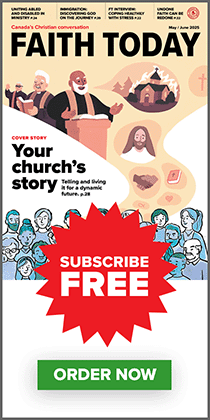Columnist Bruce Clemenger reflects on our witness to the sovereignty of God.

→en français
Earlier this year I attended a meeting featuring the foreign affairs ministers of Norway and Canada. They were discussing pluralism, shared values and collaboration. They commented on many global issues, including their support for Ukraine in the war with Russia.
In the press conference after the meeting, Canada’s foreign minister Mélanie Joly suggested Canada would welcome a regime change in Russia. This prompted Russia to make a formal protest.
Calling for a regime change within a sovereign nation is an international taboo. Last year when President Biden suggested President Putin should not remain in power, the White House quickly clarified the United States was not calling for a regime change.
Questioning the legitimacy of the leader or ruling party of a nation by another is considered a challenge to the sovereignty of the nation and a threat to its integrity. It could be interpreted as a prelude to war or a warning of attempts to destabilize the nation.
The principle of sovereign equality of nations is a core principle of the UN Charter which affirms all members "shall refrain in their international relations from the threat or use of force against the territorial integrity or political independence of any state, or in any other manner inconsistent with the purposes of the United Nations."
Individuals increasingly see themselves independent from all other authorities and accountable to no other.
In other words, I will respect your sovereignty if you respect mine, meaning my territory, my independence and my authority within my realm. Calling for a regime change is like heresy, a challenge to something sacred.
Exceptions to national sovereignty are hotly contested. The exception might be for humanitarian intervention to prevent genocide, or in situations of failed states due to the danger to residents and the threat they would pose to neighbouring countries.
Increasingly in our society individuals are claiming personal sovereignty over their individual lives – not just the freedom to pursue their own understanding of human flourishing, but to see themselves independent from all other authorities and accountable to no other. And like nations they expect their sovereignty to be honoured. They perceive those who question their choices as challenging their sovereignty, as Russia did when Canada mused about a regime change.
Scripture is clear – all power and authority exercised by humans is a delegated authority. Jesus claimed, "All authority in heaven and earth has been given to me" (Matthew 28:17). He challenged the presumption of individual sovereignty. All are under the sovereignty of God, including states.
Recall Jesus’ response to Pilate who claimed to have the power to determine His fate. Jesus said, "You would have no power over me if it were not given to you from above" (John 9:11).
The early Christians’ challenge to the asserted absolute authority of the Roman empire was interpreted as a political, destabilizing threat. They were persecuted.
Likewise, challenging the presumed sovereignty of an individual is considered a threat to their self-image. They expect their choices not merely to be tolerated, but affirmed and honoured.
The cry of rulers in Psalm 2:3 – "let us break their chains and throw off their shackles" – is actually a claim of sovereign independence against God. The nations rage and plot to deny God’s sovereignty. They "band together against the Lord" and become a law to themselves.
This is also true of people, as expressed in Romans 1:19–20: "what may be known about God is plain to them…. For since the creation of the world God’s invisible qualities – his eternal power and divine nature – have been clearly seen, being understood from what has been made, so that people are without excuse."
Yet they assert their sovereignty and become a law to themselves. And, like nations, they expect the exercise of their authority to be honoured.
Our task is to proclaim the sovereignty of God, that all power and authority of rulers is delegated to them, and that rulers are to exercise their God-given authority for good. They are accountable.
Likewise, all of us in the exercise of our freedom are but stewards and not a law to ourselves. We are the tenants, not the landlord (Matthew 21:33–42). We are all accountable.
We confess the absolute sovereignty of God. In our worship, "we ascribe to the Lord the glory due his name" (Psalm 29:2) and bear witness to this truth as we steward what has been delegated to us.

Bruce J. Clemenger is senior ambassador and president emeritus of The Evangelical Fellowship of Canada, and author of The New Orthodoxy: Canada’s Emerging Civil Religion (Castle Quay, 2022). Clifftop photo by Joshua Earle.